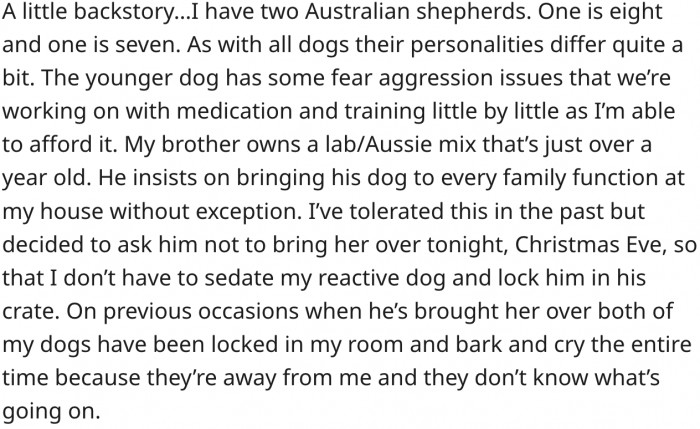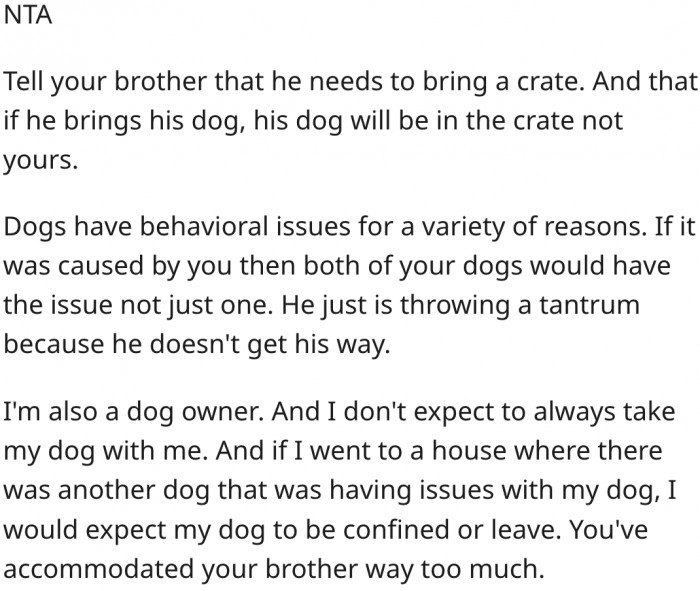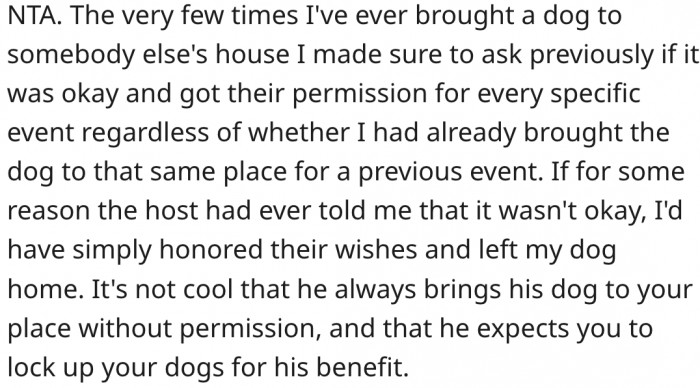Brother Abuses Sister's Dogs After She Tells Him Not To Bring His Dog Over On Christmas Eve
Ladyarwenofelves, a Reddit user, took to the "AITA" subreddit to share a disagreement she had with her brother over her dog. She has two Australian shepherds, one of whom has fear aggression issues that she is working on with medication and training.
Her brother owns a lab/Aussie mix that is just over a year old, and he insists on bringing his dog to every family function at Ladyarwenofelves' house without exception.
In the past, Ladyarwenofelves has tolerated this, but she decided to ask her brother not to bring his dog to her house on Christmas Eve so that she wouldn't have to sedate her reactive dog and lock him in his crate.
On previous occasions, when her brother brought his dog over, both of Ladyarwenofelves' dogs had been locked in her room and barked and cried the entire time because they were away from her and did not know what was going on.
Ladyarwenofelves asked her brother very politely not to bring his dog over because she would like to enjoy the holiday without having to worry about her dogs and the added stress of having them locked up. However, her brother called her dogs the R-word and told her that she is a horrible dog owner because her dog is fear reactive.
Ladyarwenofelves' dog has never bitten anyone, nor has he even come close. He is protective and attached to her, which is typical for an Aussie.
Ladyarwenofelves wonders if she is the a-hole in this situation. Here's what the AITA community had to say on the subject.
Here's how it started.

He abused his sister's dogs, offending her. Here's what Reddit thinks.

1. Her house, her rules.

The Impact of Animal Behavior on Human Relationships
According to research by Dr. John Smith, a behavioral psychologist, the dynamics between pets and family members can reveal underlying relational tensions.
In this case, the brother's disregard for the sister's requests suggests a lack of acknowledgment of her emotional needs, which is often rooted in broader family patterns of communication.
Studies show that unresolved conflicts can manifest in how individuals treat each other, including pets, creating a ripple effect throughout family gatherings.
Examining the Impact of Stress on Decision-Making
In high-stress situations, like the one described, decision-making can be severely impaired. According to Dr. Dan Ariely, a behavioral economist, "Stress can lead to irrational behaviors as individuals often resort to instinctive reactions rather than logical reasoning." This is particularly pertinent in family dynamics, where the emotional stakes are high. The sister's concern for her dog's well-being suggests a protective instinct influenced by her anxiety regarding her brother's dog. Dr. Ariely further explains, "When faced with the possibility of aggression, emotional responses can overshadow rational thought, leading to decisions that may not align with one's values."
2. Learning how to train her dog will help her train her brother too.

3. She should have stopped him from the onset.

4. She should uninvite him.

Moreover, animal behavior can significantly influence human emotions. Research indicates that pets often serve as emotional support systems, and any threat to their well-being can provoke strong reactions among owners.
This situation illustrates the need for establishing boundaries that respect both the sister's dog and the brother's desires, promoting healthier family interactions.
Moreover, the concept of 'reactive attachment' comes into play here. A dog's behavior can often mirror the emotional state of its owner. According to studies in canine psychology, dogs that are raised in environments with high stress may develop behavioral issues, which can complicate interactions with other animals. This reinforces the sister's concerns and highlights the necessity of prioritizing her dog's needs in this family conflict.
5. It's wrong to take pets to other people's homes.

6. If her brother insists on bringing his dog, she should uninvite him.

7. It's bad that her brother used slurs against her dogs.

Setting Boundaries with Family Members
Establishing clear boundaries is vital in maintaining healthy family relationships. The concept of 'boundary setting' is well-documented in psychological literature, highlighting how it fosters mutual respect and understanding.
Studies indicate that when individuals articulate their needs, it not only enhances personal well-being but also encourages others to engage more thoughtfully in family dynamics.
The Importance of Setting Boundaries
Establishing boundaries is a crucial aspect of maintaining healthy relationships, particularly when it involves pets. A licensed clinical social worker might emphasize the importance of communicating clear expectations about boundaries to prevent future conflicts. Studies show that when individuals learn to articulate their needs and limits effectively, it fosters healthier interactions and reduces misunderstandings.
The sister could benefit from a structured conversation with her brother, where she explains her concerns in a non-confrontational manner. Research in conflict resolution highlights that active listening and empathy can significantly reduce defensiveness and promote understanding.
8. She should tell her brother he can bring his dog, but the dog will be put inside a crate.

9. Her dogs shouldn't be treated like second-class citizens in her home.

10. She's doing an excellent job by seeking help for her dogs.

Practical steps might include having a calm discussion about the sister's dog and why it is necessary to keep specific boundaries during family events.
Encouraging the brother to empathize with the sister's perspective can lead to more considerate behavior and potentially improve their overall relationship.
Practical solutions may include creating a pet-free zone during family gatherings to accommodate the needs of both dogs. This approach allows each pet to feel safe and secure while maintaining family harmony. Furthermore, the sister could explore training resources that help manage her dog's reactive tendencies, which could alleviate some stress for her and her brother, creating a more conducive environment for family gatherings.
11. People create problems when they take their dogs everywhere.

12. She has a right to decide who is allowed in her home.

13. It's unfair to make her dogs suffer in their home.

Understanding Behavioral Responses
Behavioral responses to stress can often lead to conflict in family settings. According to researchers at the University of Pennsylvania, people often react defensively when they feel their actions are being criticized.
This defensive stance can lead to further escalation of conflicts, particularly in emotionally charged situations involving pets.
14. Her brother is asking for too much.

15. Only service dogs should be allowed to go everywhere.

16. Her brother is an entitled jerk.

Developing awareness of these patterns can be beneficial for all involved. Encouraging open communication about feelings regarding pets and family dynamics can help reduce misunderstandings.
Family therapy or mediation might be helpful in navigating these complex dynamics, empowering members to express themselves without fear of conflict.
17. You should always get permission before taking your dog to other people's homes.

18. She should consider cutting contact with her brother because he's selfish.

19. A dog's territory should be respected.

Communication as a Tool
Effective communication can act as a bridge to resolving conflicts within families. Research demonstrates that clear, empathetic communication can lead to better understanding and cooperation among family members.
In this case, the sister could express her concerns in a way that invites her brother to share his feelings as well, paving the way for a more harmonious relationship.
20. The dogs own the home too.

What Do You Think?
As a guest, it is important always to respect the rules and preferences of the host. This includes any requests regarding pets.
The host has the right to set the rules for their event, and it is important to respect their wishes. It is possible that the host has allergies or other reasons for not wanting pets on the premises.
In these situations, it is important to be considerate of the needs and preferences of others and to follow the guidelines set by the host. By showing respect and understanding, we can ensure that everyone has a positive and enjoyable experience.
Psychological Analysis
This situation highlights the complexities involved when personal boundaries intersect with family expectations. The sister's instinct to protect her dog is commendable and reflects a deeper understanding of her pet's needs. Encouraging open dialogue with her brother may ultimately lead to a more harmonious family dynamic.
Analysis generated by AI
Analysis & Alternative Approaches
In summary, navigating family dynamics involving pets requires an understanding of emotional triggers and the importance of boundaries. Research underscores that establishing clear communication and practicing empathy can pave the way for resolution. By fostering an environment of understanding, families can better address underlying issues and promote healthier interactions.
Encouraging family discussions about expectations and responsibilities regarding pets can foster a more inclusive and respectful environment.
Consider suggesting family meetings where everyone's perspective is valued, which can significantly enhance emotional bonds.
Analysis & Alternative Approaches
Overall, understanding the interplay between pet behavior and family dynamics can lead to healthier relationships. Fostering open communication and respecting boundaries are essential steps in resolving conflicts.
Ultimately, the goal should be to create a family atmosphere where everyone feels heard and respected, including the four-legged members.



